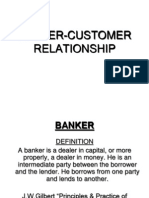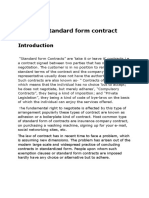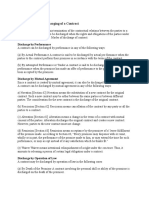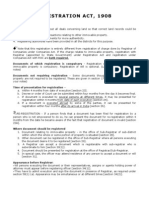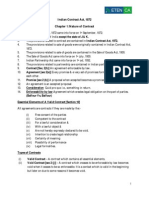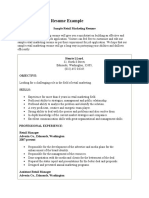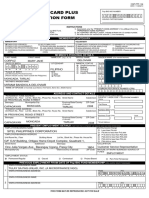The Basic of Indian Contract Act 1872
The Basic of Indian Contract Act 1872
Uploaded by
anasCopyright:
Available Formats
The Basic of Indian Contract Act 1872
The Basic of Indian Contract Act 1872
Uploaded by
anasOriginal Description:
Copyright
Available Formats
Share this document
Did you find this document useful?
Is this content inappropriate?
Copyright:
Available Formats
The Basic of Indian Contract Act 1872
The Basic of Indian Contract Act 1872
Uploaded by
anasCopyright:
Available Formats
INDIAN CONTRACT ACT, 1872
1. Indian Contract Act, 1872 came into force on 1st September, 1872.
2. It applies to whole of India except the state of J & K.
3. The provisions related to contract are contained in Indian Contract Act, 1972.
4. The provisions related to sale of goods were originally contained in Indian Contract Act,
1872.
5. The provisions related to sale of goods are contained in the Sale of Goods Act, 1930.
6. The Sale of Goods Act came into force on 1st July, 1930.
7. Indian Partnership Act came into force on 1st oct, 1932.
8. The provisions related to partnership are contained in Indian partnership Act, 1932.
9. Contract [Sec. 2(h)] An agreement enforceable by law.
10. Agreement [sec 2(e)] Every promise & e very set of promises forming consideration for
each other.
11. Promise [sec 2 (b)] A proposal when accepted becomes a promise.
12. An agreement is an accepted proposal.
13. Consideration Quid pro quo i.e., something in return.
14. Enforceability by law Agreement which creates legal obligation on the part of parties.
(Balfour Vs. Balfour)
ESSENTIAL ELEMENTS OF A VALID CONTRACT [SECTION 10]
All agreements are contracts if they are made by the:(i)
Free consent of the parties
(ii)
Competent to the contract.
(iii)
For a lawful consideration &
(iv)
With a lawful object &
(v)
Are not hereby expressly declared to be void.
(vi)
Intention to create legal relationship
(vii) Certainty of meaning
(viii) Possibility of performance
(ix)
Legal formalities.
TYPES OF CONTRACTS
(i)
(ii)
(iii)
(iv)
Valid Contract A contract which contains all essential elements.
Void Contract [sec 2 (j)] A contract which creases to be enforceable by law
becomes void when it ceases to be so enforceable. It is a contact which is valid in
the beginning but later on due to some reasons it becomes void.
Void Agreement [Sec 2(g)]- An agreement not enforceable by law. It is void from
the very beginning when it is made. It is void ab initio.
Voidable Contract [Sec 2 (i)] A contract which is enforceable by law at the
option of one party but not at the option of other(s). Here, only one party can go
to the court of law, other party cannot go to the court of law.
RAJNISH PANDEY [ CS-EXECUTIVE]
Page 1
INDIAN CONTRACT ACT, 1872
(v)
(vi)
(vii)
(viii)
(ix)
(x)
1.
2.
3.
4.
5.
6.
7.
Illegal Agreement An agreement the consideration of object of which is
unlawful [sec. 23].
Unenforceable contract It is one which is good in substance but due to some
technical defect such as absence in writing, signing one or more parties cannot
sue upon it.
Unilateral Contract Obligation is pending on the part of one of the parties to
the contract.
Bilateral Contact Obligation is pending on the part of both of the parties to the
contract.
Executed Contract A contract which is completed. Where parties to the
contract have performed their respective obligations.
Executory contract A contract which is to be performed in future.
TIME BARRED DEBT
Indian limitation Act, 1923 A debt is said to be time barred on expiry of 3 years
from the due date, if the amount has not been recovered and also no action has
been taken for recovery of the amount.
A time barred debt is not recoverable.
A written promise to pay time barred debt & signed by the promisor or his duly
authorized agent is valid.
A person who pay time barred debt, in ignorance of Indian Limitation Act, 1963
(Indian Law), cannot recover it back.
In case of appropriation of payment, here there is an appropriation by time,
payment may appropriated to the debt first in time, whether time barred or not.
An agreement which is not legally enforceable but binding in honour only is invalid.
In commercial & Business Agreements, the intention of parties to create legal
relationship is presumed to exist.
Proposal [sec 2(a)]/Offer Where one person signifies to another his willingness to do or to
abstain from doing anything with a view to obtaining the consent of that either to such act
or abstinence, he is said to make a proposal.
Acceptance [sec 2 (b)] Where the person to whom proposal is made signifies his assent
thereto, the proposal is said to be accepted.
Legal rules regarding offer
(i)
Offer must be capable of creating the legal relationship. (ii) Offer must be
certain, definite and not vague.
(ii)
Offer may be express or implied. (iv) Offer must be distinguish from an invitation
to offer.
(iii)
Offer may be conditional.
(iv)
Offer may be specific or general.
(v)
Offer must be made with a view to obtaining the assent of the offeree.
RAJNISH PANDEY [ CS-EXECUTIVE]
Page 2
INDIAN CONTRACT ACT, 1872
(vi)
(vii)
(viii)
An offer should not contain a term of non compliance which may amount to
acceptance.
Offer must be communicated to the person to whom it is made.
Special terms to an offer must be communicated.
TYPES OF OFFER
(i) General Offer An offer made to the public at large. Anyone having knowledge
knowledge of the
offer can accept this offer by complying with the terms of offer.
(ii) Specific Offer An offer made to a specified person. This offer can be accepted only by
the person to whom it is made
(iii) Cross Offers When two persons exchange identical offer in ignorance of each others
offer. Two cross offers cannot made a contact.
(iv) Counter Offer Qualified acceptance to the offer & counter offer amounts to rejection
of the original offer.
(v) Standing /open/continuing
/continuing offer An offer which is allowed to remain open over a
period of time.
Tender for supply of goods is an example of General offer & standing offer.
(i)
(ii)
(iii)
RULES REGARDING VALID ACCEPTANCE
Acceptance must be absolute and unqualified.
Mere silence is not an acceptance.
Acceptance must be communicated.
Mode Of
Acceptance
Mode prescribed
in praposal
No mode
prescribed in
praposal
According to mode
prescribed
According to some
reasonable and
usual mode
Consideration [Sec 2(d)] When at the desire of the promisor, the promisee or any
other person has been done or abstained from doing or, does or abstains from doing or
promise to do or to abstain from doing something. Such an act or abstinence or promise is
called consideration for the promise. Technical word Quid pro Quo i.e., something in
return.
Legal rules regarding consideration
1. Consideration must move at the desire of the promisor.
INDIAN CONTRACT ACT, 1872
2.
3.
4.
5.
6.
7.
8.
Consideration may move from the promisee or any other person.
Executed Consideration Consideration which has been given.
Executory Consideration Consideration which is to be moved in future.
Consideration may be past, present or future.
Consideration should be real & not illusory.
Consideration need not be adequate.
The performance of an act what one is legally bound to perform is not consideration
for the contact.
9. Consideration must not be unlawful, immoral or opposed to the public policy. There
can be a stranger to a consideration but there cannot be a stranger to a contract.
A third party or stranger to a contract cannot sue.
Exceptions:
1. Trust Beneficiary can sue upon the contract.
2. Family Settlement Other family members can sue.
3. Marriage contract Female member for her marriage expenses on partition of HUF.
4. Acknowledgement of liability when one admits his liability.
5. Assignment Assignee can enforce upon the contract.
6. Covenant running with land.
No Consideration, no contract (An agreement without consideration is void). [section 25].
Exceptions:
1. Agreement on account of natural love and affection is valid if is(a) Written and registered agreement
(b) On account of natural love & affection.
(c) Between parties standing in near relation.
2. Compensation for past voluntary services
3. Promise to pay time barred debt:- 1. In writing 2. Signed
4. Agency
5. Completed gift
6. Charity
7. Bailment.
An acceptance is to offer what is a lighted match is to a train of gunpowder. [Sir William
Anson]
COMMUNICATION OF OFFER AND ACCEPTANCE
Communication of offer is complete when
1. it comes to the knowledge of the person to whom it is made (i.e., when the letter of
offer reaches to offeree).
2. Communication of Acceptance is complete.
RAJNISH PANDEY [ CS-EXECUTIVE]
Page 4
INDIAN CONTRACT ACT, 1872
(A) As against the proposer when it is put into the course of transmission to him so as
to be out of power of the acceptor to withdraw the same (when letter of Acceptance
posted).
(B) As against the acceptor When it comes to the knowledge of the proposer. (i.e.,
when letter of Acceptance reaches to the proposer).
Communication of Revocation is complete
(A) AS against the person who made it, when it is put into the course of transmission to the
another person so as to be out of power of the person making it.
(B) As against the person to whom it is made, when it reaches to him.
OTHER IMPORTANT POINTS
1. A bid at an auction sale is an implied offer to buy.
2. A proposal is revoked by death or insanity of the proposer, if the fact of insanity or
death comes to the knowledge of the acceptor before acceptance.
3. An agreement to agree in future is invalid.
MEANING OF TERMS
1. Offeror The person who made the offer.
2. Offeree The person to whom offer is made.
3. Promisor The person who makes the promise.
4. Promisee The person to whom promise is made
PARTIES COMPETENT TO CONTRACT
1. Major
2. Sound mind
3. Person not disqualified by law from contracting
PARTIES INCOMPETENT TO CONTACT
1. Major
2. Unsound mind person
3. Person disqualified by law from contracting
NOTE - Age of majority is defined u/s 3 of Indian Majority Act, 1875
Major A person who has completed 18 years of age.
Exceptions
1. Guardian appointed by court
2. Superintendent appointed 21 years.
NOTES
1. A person who is usually of sound mind but occasionally of unsound mind cannot made
contract when he is of unsound mind.
2. A person who is usually of unsound mind but occasionally of sound mind may make a
contract when he is of sound mind.
3. Unsound Mind Persons Drunkard, Idiot, Lunatic.
4. Persons disqualified by Law
1. Alien enemy
2. Statutory corporation
RAJNISH PANDEY [ CS-EXECUTIVE]
Page 5
INDIAN CONTRACT ACT, 1872
3. Municipal bodies
4. Sovereign states Ambassadors & Diplomatic couriers
5. Convict
6. Insolvent
contract entered
during war
alean enemy
contract before war
with the permission
of Central
Government
without the
permission of
Central Government
SUSPENDED or
DISSOLVED
5 A contract with incompetent person is void-ab-initio.
POSITION OF MINORS AGREEMENT
1. An agreement entered into by or with a minor is void-ab-initio [ Mohiri Bibi Vs.
Dharmodas Ghose]
2. Minor can be beneficiary.
3. Minor cannot become a partner but he can be admitted to the benefits of partnership
with the consent of all partners.
4. Minor can always plead minority.
5. Ratification on attaining majority is not allowed.
6. Contract by minors guardian is valid if it is within the scope of guardians authority and it
is for the benefit of minor.
7. Minor is not personally liable for necessaries supply to him but minors property is liable,
not only for necessary goods, but also for necessary services. [Nash Vs. Inman]
8. Minor can be an agent but cannot be held personally liable for breach of duty or
negligence.
9. A minor cannot be declared insolvent because he is incapable of contracting.
CONSENT [SECTION 13] Agreed upon same thing in the same sense consensus ad-idem
meeting/Identity of mind.
FREE CONSENT [SECTION 14] A consent is said to be free if it is not caused by
(a) Coercion or
(b) Undue influence or
(c) Fraud or
(d) Misrepresentation or
(e) Mistake.
COERCION [SEC 15] Coercion is committing or threatening to commit an act forbidden by
IPC or the unlawful detaining or threatening to detain any property to the prejudice of any
person, whatever with intention of causing him to enter into an agreement.
1. A threat to commit suicide amounts to coercion.
RAJNISH PANDEY [ CS-EXECUTIVE]
Page 6
INDIAN CONTRACT ACT, 1872
2. A person to whom money has been paid or anything delivered must repay or return
it.
UNDUE INFLUENCE [SEC 16] A contact is said to be induced by undue influence where the
relation subsisting between the parties are such that one of the parties is in a position to
dominate the will of another and uses that position of obtain an unfair advantage over the
other.
A person is in a position to dominate the will of another where he holds real or
apparent authority over the other or stands in fiduciary relation to the other.
FRAUD [SEC 17] (Intention to Deceive)
(a) The suggestion as a fact which is not true by one who does not believes it to be true.
(b) Active concealment of fact by one having knowledge or belief of the fact.
(c) A promise mode without any intention of performing it.
(d) Any other act fitted to deceive.
(e) Any such act or omission as to law specially declared to be fraudulent.
MERE SILENCE IS NOT A FRAUD. Exception:
Where is the duty of person to speak.
Where silence is equivalent to speech.
MISREPRESENTATION Where a person asserts something which is not true though he
believe it to be true.
* A contact induced by Coercion, undue influence, fraud or misrepresentation is voidable.
MISTAKE
MISTAKE
MISTAKE OF FACT
UNILATERAL
One party
under mistake valid
BILATERAL
Both parties
under mistake
- void
MISTAKE OF LAW
INDIAN LAW
VALID
FORIEGN LAW
VOID
SOME OTHER IMPORTANT POINTS:1. Moral pressure is involved in case of undue influence.
2. Ignorance of law is of no excuse.
3. A contract is not voidable if fraud or misrepresentation does not induce the other party to
enter into contract.
4. A party cannot complain of fraudulent silence if he has the means of discovering the truth
with ordinary means.
5. Coercion must be exercised against promisor or any other person.
RAJNISH PANDEY [ CS-EXECUTIVE]
Page 7
INDIAN CONTRACT ACT, 1872
6. An attempt to deceive is not fraud unless the other party is actually deceived.
Section 23 Consideration or object is unlawful if it is:(a) Forbidden by law or
(b) Of such nature that if permitted, defeat the provisions so any law or
(c) Fraudulent
(d) Involves injury to a person or property of another
(e) Immoral or opposed to the public policy.
VOID AGREEMENTS
Agreement without consideration
Agreement with incompetent parties
Uncertain agreement
Agreement made under mutual mistake of fact.
Agreement with unlawful consideration or object.
Illegal agreements
Agreement to do an impossible act
Wagering agreements
A. Collateral transactions to a wagering agreement are valid.
B. Speculative transactions are generally valid.
AGREEMENTS OPPOSED TO THE PUBLIC POLICY
Trading with Alien enemy
Champerty & maintence
Stifling prosecution
Interference with the course of justice
Marriage brokerage contracts
Interest against obligation
Sale of public office
Agreement for creation of monopolies
Agreement in restraint of trade
Agreement in restraint of marriage
Agreement in restraint of legal proceeding
CONSIDRETION UNLAWFUL IN PART
CONTRACT IS INSEPARABLE
CONTRACT IS ALTOGETHER
VOID
RAJNISH PANDEY [ CS-EXECUTIVE]
CONTRACT IS SEPARABLE
LEGAL PART
VALID
ILLEGAL PART
VOID
Page 8
INDIAN CONTRACT ACT, 1872
WAGERING AGREEMENT It is an agreement involving payment of a s sum of money upon
the determination of uncertain event.
OTHER IMPORTANCE POINTS
Compromise of public offence is illegal.
Maintence Promotion of litigation in which one has no interest.
Champerity It is a bargain whereby one party agrees to assist another in recovering
property, with a view to sharing the profits of litigation.
All agreements on account of champerity and maintence are neither void nor valid.
Some of them may be void, some of them are valid.
An agreement which provides for a reference to arbitration instead of court of law is
valid even if it is in restraint of legal proceeding.
1. Where a contract involves the exercise of personal skill and diligence, it must be
performed by the promisor himself.
2. In case of death of promisor, the liability of legal representative is limited to the value of
the property they inherited from the deceased.
3. If all of the joint promisers dies, their legal representatives are bound to perform the
promise jointly.
4. Succession Both burden & benefits are transferred.
5. Assignment Only benefits are transferred, not the liability there upon.
6. Reciprocal Promises [Sec 2(f)] When a contract consists a two promises, one being
consideration for the other such promises are called reciprocal promises.
TIME ESSENTIAL
LATE PERFORMANCE
7.
TIME IS NOT ISSENTIAL
LATE PERFORMANCE
BUT WITHIN RESONABLE
CONTRACT BECOME VOIDABLE
AT THE OPTION OF PROMISEE
CONTRACT CAN NOT
AVOIDED PROMISEE IS
INTITLED TO
COMPENTATION
8. If debt to be discharged is not indicated by the Debtor, then creditor may apply it, if
creditor does not appropriate it, it will be applied in discharge of debt in order of time,
whether time barred or not.
9. Novation Old contract is cancelled & new contract is formed. Parties may or may not
change.
10. Recession Old contract is cancelled, no new contract is formed.
11. Alternation Changing in the terms of original contract, parties must remain same
12. Remission To remit or waive off the performance by promise.
13. In case of voidable contract, if aggrieved party rescinds the contact, it must return the
benefit received there under.
14. Void Contract/Agreement Either restore back the advantage received or pay
compensation for it.
15. Discharge of contract by
RAJNISH PANDEY [ CS-EXECUTIVE]
Page 9
INDIAN CONTRACT ACT, 1872
Actual or attempted performance.
Mutual agreement Novation, Alternation, Remission, Recession.
Impossibility of performance.
Lapse of time e.g. Time barred debt.
Operation of law such as death or insolvency.
Actual or anticipatory Breach.
16. Where the performance of promise by one party depends upon the prior performance
of promise by the other party, such promises are mutual & dependent.
BREACH OF CONTRACT
Actual Breach Breach of contract on the due date of performance or during the
performance.
Anticipatory Breach Breach of contract before time of performance has arrived i.e.,
before due date of performance.
DAMAGES IN CASE OF BREACH
1. Ordinary damages Compensation for any loss or damage which arise naturally in
the normal course of event of Breach.
2. Special Damages It cannot be recovered as a matter of right. These can be
recovered only if the notice of special circumstances is given.
3. Vindictive damages/Exemplary Damages For Breach of promise to marry or for
wrongful dishonor by banker of his customer cheque.
4. Nominal Damages Where plaintiff proved that there is breach of contract but he
has not suffered any real damage. These may be a single rupee or even 10 paisa.
These are awarded to maintain the right to decree in the court.
5. Remote Damage Indirect loss from breach of contract. Remote Damages are not
recoverable.
6. Damages for deterioration coursed due to delay Deterioration
Not only implies physical damages to goods but also loss of special opportunity for
sale damages can be recovered from carrier even without notice.
7. Calculation of Damage
Breach by buyer Damage = Contact Price Market price on date of Breach.
Breach by seller Damage = Market price on date of Breach Contract price.
8. Remedies for Breach of Contact
Right to rescind the contract
Right to claim damages
Right to continue the contract
Suit upon Quantum Meruit (as much as is earned or according to the quality
of work done)
Suit for specific performance
Suit for injunction
RAJNISH PANDEY [ CS-EXECUTIVE]
Page 10
INDIAN CONTRACT ACT, 1872
Injunction order is issued by the court when a party do what he promised not
to do.
Other points: A contract is not frustrated by commercial impossibility
In case of anticipatory breach, the aggrieved party may treat the contract
(a) As discharged and bring an immediate action for damages
(b) As operative and wait till the time of performance arrives.
A party entitled to rescind the contract, loses the remedy where
(a) He has ratified the contract
(b) The third party acquired the right in good faith
(c) Contract is not separable and recession is sought of one part only.
CONTINGENT CONTRACT
Contingent Contract [Sec 31] It is a contract to do or not to do something, if some
event collateral to such contract, does or does not happens.
Contract of Insurance is a contingent contract.
When the contingent event is the part of contract, the contract is conditional one, &
where it is collateral to the contract, it is a contingent contract.
CONTINGENT CONTRACT
EVENT HAPPENING
EVENT HAPPENS
HAPPENING OF EVENT
BECOMES INPOSSIBLE
VALID
VOID
AN EVENT
HAPPENS
EVENT NOT HAPPENING
VOID
HAPPENING OF EVENT
BECOMES INPOSSIBLE
VALID
The basis of Quasi contractual relations is the prevention of unjust enrichment at the
expense of others.
CONTACT CONTINGENT
RAJNISH PANDEY [ CS-EXECUTIVE]
FUTURE CONDUCT OF LIVING
PERSON
VALID DUE TO IMPOSSIBILITY OF
AN EVENT DUE TOCONDUCT OF
SUCH PERSON
Page 11
INDIAN CONTRACT ACT, 1872
QUASI CONTRACT
Right in rem Right against the entire world.
Right in personam Right against a particular person.
1. Quasi contractual right is a right in personam.
2. Quasi contracts are implied by law.
TYPES OF QUASI CONTRACTS
Claim of necessaries supplied to an incompetent person, supplier can recover the
price from the property of such person.
Right to recover money paid for another.
Obligation of a person enjoying the benefit of non gratuitous act.
Responsibility of finder of goods = same as bailee.
A person to whom money has been paid or anything delivered under coercion or by
mistake must repay or return it.
RAJNISH PANDEY [ CS-EXECUTIVE]
Page 12
You might also like
- Engineering Management by Roberto Medina 1 PDFDocument139 pagesEngineering Management by Roberto Medina 1 PDFCassidy Peter91% (11)
- Sem-I Law of Contract-IDocument4 pagesSem-I Law of Contract-IRakshith100% (2)
- Indian Companies IILF Chennai 2019Document106 pagesIndian Companies IILF Chennai 2019raghunath670743No ratings yet
- Creating Prepack Articles in FMSDocument7 pagesCreating Prepack Articles in FMSMalith Tharaka PereraNo ratings yet
- Indian Contract Act 1872Document18 pagesIndian Contract Act 1872Aman SinghNo ratings yet
- ContractDocument7 pagesContractfreebirdovkNo ratings yet
- Judiciary Notes - ContractDocument10 pagesJudiciary Notes - ContractYash SinghNo ratings yet
- Contingent ContractDocument2 pagesContingent ContractUnknownNo ratings yet
- Doctrine of ElectionDocument7 pagesDoctrine of ElectionMANJU BANGERNo ratings yet
- Rent:-: Shrimati Ram Devi vs. Hazari, 1972 PLJ 743Document6 pagesRent:-: Shrimati Ram Devi vs. Hazari, 1972 PLJ 743Duryodhan GuliaNo ratings yet
- Registration Act, 1908 - FAQDocument10 pagesRegistration Act, 1908 - FAQravindrarao_m0% (1)
- Contracts Which Cannot Be Specifically EnforcedDocument5 pagesContracts Which Cannot Be Specifically EnforcedZeesahnNo ratings yet
- Discharge of ContractDocument4 pagesDischarge of Contractgoon baboonNo ratings yet
- Capacity To ContractDocument44 pagesCapacity To ContractPunit Sukhwani100% (1)
- B 8 MaterialalterationDocument3 pagesB 8 MaterialalterationAnand marathe100% (1)
- Definition of ContractDocument3 pagesDefinition of ContractAmmar KhanNo ratings yet
- Discharge of Contract by AgreementDocument11 pagesDischarge of Contract by AgreementAadhitya NarayananNo ratings yet
- Banker CustomerDocument38 pagesBanker CustomerUmer Chaudhary100% (1)
- Discharge of ContractDocument12 pagesDischarge of ContractlakshamuNo ratings yet
- Discharge of ContractDocument3 pagesDischarge of Contractmalik yasirNo ratings yet
- Report On Agency ContractDocument36 pagesReport On Agency Contracttejcd1234No ratings yet
- The Sale of Goods Act, 1930 PDFDocument24 pagesThe Sale of Goods Act, 1930 PDFMohan Murge walaNo ratings yet
- BR Ch-2 Contract LawDocument12 pagesBR Ch-2 Contract LawROHITHNo ratings yet
- 1 The Indian Contract Act 1872Document33 pages1 The Indian Contract Act 1872Varad Jakite100% (1)
- Lawful Consideration and ObjectDocument15 pagesLawful Consideration and Objectanilmourya550% (2)
- Everything You Wanted To Know About Stamp Duty: Article No. Description of InstrumentDocument8 pagesEverything You Wanted To Know About Stamp Duty: Article No. Description of InstrumentAbhishek YadavNo ratings yet
- Contract Act 1872Document6 pagesContract Act 1872abhinav_surveyor1355No ratings yet
- Public Demands Recovery Act, 1913 Definition of Public Demands: in General Meaning, PublicDocument7 pagesPublic Demands Recovery Act, 1913 Definition of Public Demands: in General Meaning, PublicHasanul ShawonNo ratings yet
- Standard Form ContractsDocument2 pagesStandard Form ContractsGyan PrakashNo ratings yet
- Section 11 of Sale of Goods Acts StateDocument9 pagesSection 11 of Sale of Goods Acts Stateshivanika singlaNo ratings yet
- Land Laws..Document17 pagesLand Laws..Mayuri KhandelwalNo ratings yet
- Double Taxation ReliefDocument2 pagesDouble Taxation Reliefs4sahithNo ratings yet
- Indian Contract Act 1872Document5 pagesIndian Contract Act 1872Nivedita RajeNo ratings yet
- MV Act NotesDocument5 pagesMV Act NotesnkthridevprinceNo ratings yet
- Guarantee For Past DebtDocument12 pagesGuarantee For Past DebtRaj KrishnaNo ratings yet
- Law of Contract I PDFDocument71 pagesLaw of Contract I PDFSharath AlimiNo ratings yet
- Capacity To ContractDocument37 pagesCapacity To ContractMeghaNo ratings yet
- Standard Form ContractDocument18 pagesStandard Form ContractImran Pathan100% (1)
- Indian Contract Act 1872Document31 pagesIndian Contract Act 1872MITRA SIMRAN ANEEL 2010331No ratings yet
- The Indian Trusts ActDocument4 pagesThe Indian Trusts ActSunita ParuiNo ratings yet
- Unit 2 Study MaterialDocument23 pagesUnit 2 Study MaterialPoorna PrakashNo ratings yet
- The Registration Act, 1908Document86 pagesThe Registration Act, 1908zohaibhassan_lashariNo ratings yet
- Consideration & ObjectDocument23 pagesConsideration & ObjectMaryam MalikNo ratings yet
- Unit - 1 Indian Contract Act, 1872 NotesDocument43 pagesUnit - 1 Indian Contract Act, 1872 NotesshobhanaNo ratings yet
- Fixation of SeniorityDocument19 pagesFixation of SenioritypzohmingthangaNo ratings yet
- Acceptance of DepositsDocument19 pagesAcceptance of DepositsRam IyerNo ratings yet
- Various Modes of Discharging of A Contract Various Modes of Discharging of A ContractDocument5 pagesVarious Modes of Discharging of A Contract Various Modes of Discharging of A ContractIranzi Fabrice100% (7)
- Module 2 (B) Promissory Note: Negotiable Instruments Act (Module 2B) The LAW LearnersDocument5 pagesModule 2 (B) Promissory Note: Negotiable Instruments Act (Module 2B) The LAW LearnersAbhishek100% (1)
- Arbitration Law Case CommentaryDocument9 pagesArbitration Law Case CommentaryKoustav BhattacharyaNo ratings yet
- Be Legal, Be Intelligent: Principle of Insurable InterestDocument11 pagesBe Legal, Be Intelligent: Principle of Insurable InterestPardeep RoyalNo ratings yet
- Contract-II - Effect of Material Alteration in Negotiable InstrumentDocument18 pagesContract-II - Effect of Material Alteration in Negotiable InstrumentMohit Mittal50% (4)
- Specific Performance of Contract1587Document21 pagesSpecific Performance of Contract1587Nishita GuptaNo ratings yet
- Modi Law College, Kota: Case: Commissioner-Cum-Secretary, Dept. of Animal Husbandry Vs Smt. K. RinzingDocument4 pagesModi Law College, Kota: Case: Commissioner-Cum-Secretary, Dept. of Animal Husbandry Vs Smt. K. RinzingPriyanka SinghNo ratings yet
- Darfting and Pleading SlidesDocument29 pagesDarfting and Pleading Slidesbik11111No ratings yet
- Registration ActDocument2 pagesRegistration Actrahulsgupta100% (1)
- DischargeDocument33 pagesDischargeNida Khatri100% (1)
- Arbritration and Conciliation - Paper 5Document21 pagesArbritration and Conciliation - Paper 5tarundaburNo ratings yet
- Discharge of ContractDocument7 pagesDischarge of ContractPrameet PaulNo ratings yet
- Transfer of Property Act NotesDocument6 pagesTransfer of Property Act Notesshail publicNo ratings yet
- Short Notes - IPCC LawDocument18 pagesShort Notes - IPCC Lawshivamdubey12No ratings yet
- 10 Steps To Implement A Disaster Recovery Plan - QTS White PaperDocument14 pages10 Steps To Implement A Disaster Recovery Plan - QTS White PaperShiva PrasadNo ratings yet
- Sample Retail Marketing ResumeDocument2 pagesSample Retail Marketing Resumechirutha84No ratings yet
- Top 3 Trade Setups PDFDocument12 pagesTop 3 Trade Setups PDFashlogic90% (10)
- Charlotte Beers at Ogilvy & Mather WorldwideDocument3 pagesCharlotte Beers at Ogilvy & Mather Worldwidemariya100% (1)
- GAS Arabian Services Company Limited: Job DescriptionsDocument3 pagesGAS Arabian Services Company Limited: Job DescriptionsAbin Jacob Alex100% (1)
- Feeding America + Robin Hood ArmyDocument5 pagesFeeding America + Robin Hood ArmyAlex SmitsNo ratings yet
- Communiqué de Presse Deal EasyvoyageDocument2 pagesCommuniqué de Presse Deal EasyvoyagertocquetNo ratings yet
- Nepal Rastra Bank ReportDocument70 pagesNepal Rastra Bank ReportSuresh AryalNo ratings yet
- Essay On Indian Agriculture: Home Share Your Files Disclaimer Privacy Policy Contact Us Prohibited ContentDocument3 pagesEssay On Indian Agriculture: Home Share Your Files Disclaimer Privacy Policy Contact Us Prohibited ContentkanishkNo ratings yet
- European-Semester Thematic-Factsheet Transport enDocument25 pagesEuropean-Semester Thematic-Factsheet Transport enIon DouNo ratings yet
- Elcock V Johnson (1949) 2 All E.R. 381Document11 pagesElcock V Johnson (1949) 2 All E.R. 381Aisha Miller100% (2)
- PPAY MD070 Application Extensions Technical Design V1.0Document20 pagesPPAY MD070 Application Extensions Technical Design V1.0Seenu DonNo ratings yet
- Dract Fee Protection Agreement YOGIDocument3 pagesDract Fee Protection Agreement YOGIkandamian8045No ratings yet
- Order FL0132916786: Mode of Payment: CODDocument2 pagesOrder FL0132916786: Mode of Payment: CODJagruc MahantNo ratings yet
- PFF108 LoyaltyCardPlusApplicationForm V07 UPDATEDDocument2 pagesPFF108 LoyaltyCardPlusApplicationForm V07 UPDATEDjane deloviarNo ratings yet
- Muster Roll Cum Wage RegisterDocument6 pagesMuster Roll Cum Wage Registervickyr070% (1)
- DS Syllabus PDFDocument4 pagesDS Syllabus PDFBhushan JadhavNo ratings yet
- Vendor Data Migration Using LSMW For Custom FieldsDocument2 pagesVendor Data Migration Using LSMW For Custom FieldsRicky DasNo ratings yet
- Ambuja CementsDocument46 pagesAmbuja CementsSuchitra ReddyNo ratings yet
- DocumentDocument4 pagesDocumentjohartsf04No ratings yet
- The Basics of ScrumDocument9 pagesThe Basics of ScrumKosta MaksinNo ratings yet
- IRR Revisions 2016 (25 Aug 2016)Document32 pagesIRR Revisions 2016 (25 Aug 2016)rina100% (1)
- BSG - Team AssignmentDocument4 pagesBSG - Team AssignmentGuo GuiNo ratings yet
- ReportDocument7 pagesReportakgoldy123No ratings yet
- Fluid Mechanics by RK Bansal Scribde - Google SearchDocument2 pagesFluid Mechanics by RK Bansal Scribde - Google SearchJebDes0% (1)
- 2011 CBA Shifting Application FormDocument2 pages2011 CBA Shifting Application FormSamae RellorosaNo ratings yet
- Redbook Vol1part1 LPCBDocument755 pagesRedbook Vol1part1 LPCBvbgiri0% (1)


















